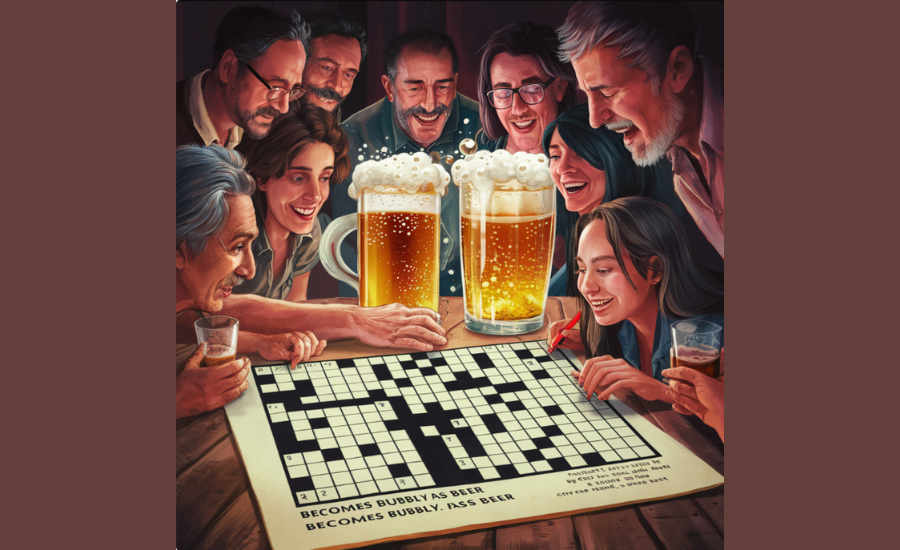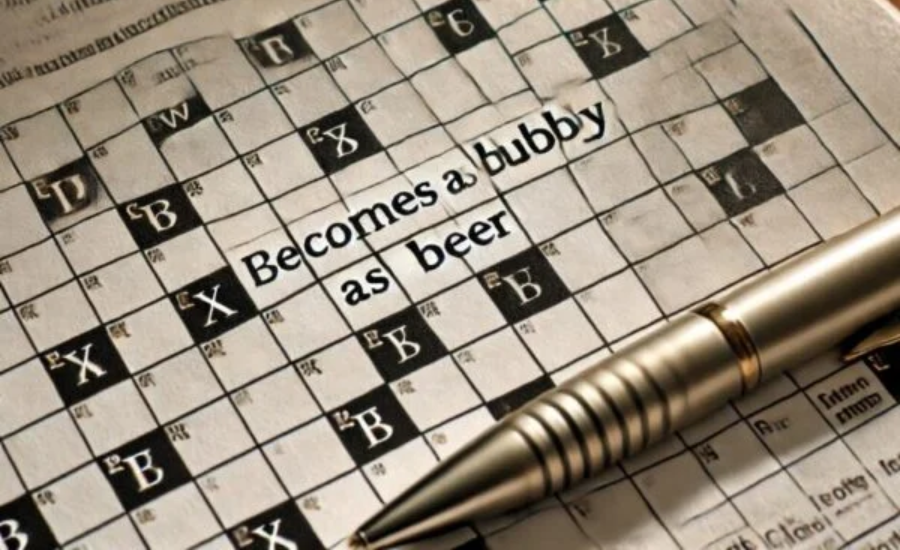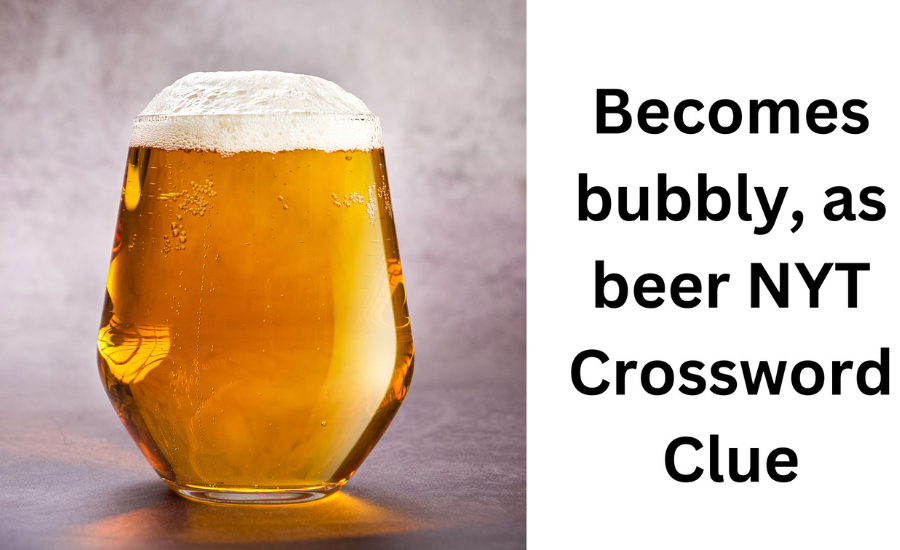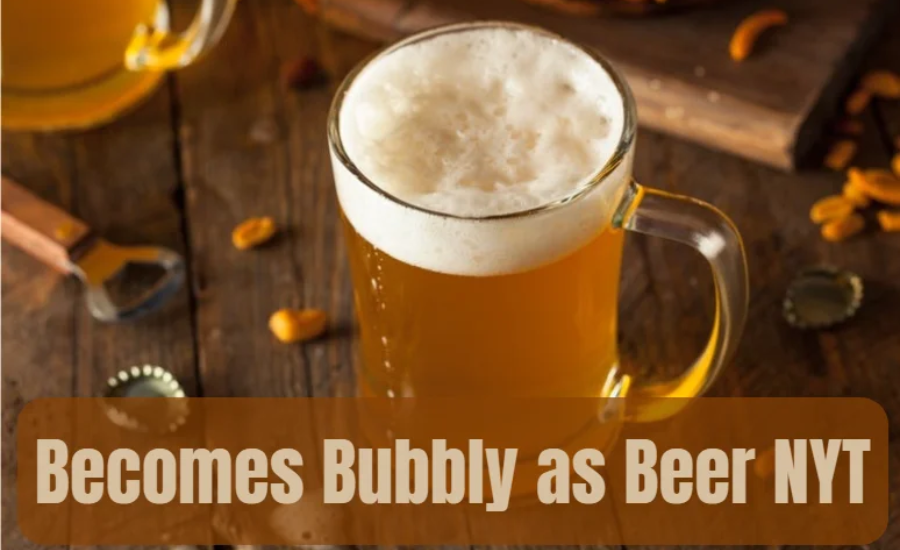Crossword puzzles have long captivated minds with their blend of mental stimulation and satisfaction upon completion. While some clues provide straightforward answers, others, such as “Becomes Bubbly as Beer,” challenge solvers with clever wordplay. This article explores various types of crossword clues, focusing on deciphering the clue “Becomes Bubbly as Beer.”
The Nature Of Crossword Clues

Crossword clues vary significantly in complexity and style. Understanding these variations is crucial for effective solving. Here are some common types of wordplay used in crossword clues:
- Puns: A pun involves a play on words where the answer is revealed by interpreting a word or phrase in an unexpected way.
- Anagrams: This technique involves rearranging the letters of a word or phrase to find the answer.
- Synonyms: Sometimes, a clue provides a word or phrase that is a synonym for the answer.
- Metaphorical Language: Clues may use metaphors to indirectly hint at the answer, requiring a more abstract interpretation.
Recognizing the type of wordplay used in a clue helps in solving it effectively.
Analyzing The Clue: “Becomes Bubbly as Beer”
The clue “Becomes Bubbly as Beer” does not offer a direct definition but employs metaphorical language and imagery. Here’s a breakdown of the clue:
- “Becomes Bubbly”
- This segment suggests a transformation into something bubbly, which could refer to something fizzy or sparkling. In the context of wordplay, it might point to a synonym or an action related to becoming bubbly.
- “as Beer”
- Beer is known for its bubbles or foam when poured. This hints that the answer relates to this characteristic of beer. To solve the clue, think about what makes beer bubbly.
The Answer: “Fizzes”

The answer to the clue “Becomes Bubbly as Beer” is likely “fizzes.” Here’s why:
- Wordplay Analysis: The term “fizzes” describes the action of becoming bubbly, akin to what happens to beer as it releases carbon dioxide and forms bubbles.
- Synonym Connection: “Fizzes” is a synonym for becoming effervescent or bubbly, aligning well with the imagery in the clue.
The Role Of Metaphor In Crossword Clues
Crossword puzzles often require solvers to think beyond literal meanings and engage with metaphorical language. The clue “Becomes Bubbly as Beer” exemplifies how metaphors and imagery guide solvers toward the correct answer. Understanding metaphorical language is key to solving such clues effectively.
Cognitive Benefits Of Solving Crossword Puzzles

Crossword puzzles are more than just entertainment; they offer cognitive benefits. Regularly solving puzzles enhances vocabulary, improves problem-solving skills, and sharpens memory. Clues like “Becomes Bubbly as Beer” involve lateral thinking and abstract connections, which contribute to cognitive health.
Strategies For Solving Metaphorical Clues
To effectively tackle metaphorical or wordplay-based clues, consider these strategies:
- Think About Synonyms: Identify words or phrases that could be synonyms of key terms in the clue.
- Visualize the Clue: Picture the scenario described in the clue to gain insights into possible answers.
- Look for Puns or Wordplay: Determine if the clue uses a pun or play on words.
- Break Down the Clue: Analyze each part of the clue individually before connecting them.
Fun Facts About Crossword Clues
- Historical Roots: The first crossword puzzle was published in the New York World newspaper on December 21, 1913, by Arthur Wynne. It was originally called a “Word-Cross.”
- Clever Wordplay: Crossword clues often use puns or wordplay. For example, the clue “Nice Summer?” hints at the answer “ÉTÉ,” the French word for “summer.”
- Common Themes: Many crossword puzzles feature themes where several clues relate to a central idea. For instance, a puzzle might have a theme related to “types of beer” with clues like “Bubbly brew” (answer: ALE).
- Cryptic Crosswords: In cryptic crosswords, every clue is a puzzle in itself, often requiring solvers to think outside the box. These puzzles are particularly popular in the UK.
- Solvers’ Satisfaction: Completing a challenging crossword puzzle is often likened to the runner’s high experienced after a marathon, known as the “crossword solver’s high.”
FAQs About Crossword Clues
Q: What are the different types of crossword clues?
A: Crossword clues can include direct definitions, synonyms, anagrams, puns, and metaphorical language. Each type presents a unique challenge and requires different solving strategies.
Q: How do I improve at solving metaphorical crossword clues?
A: Practice is essential. Start by recognizing patterns, consider possible synonyms, visualize the clue’s scenario, and look for wordplay or puns.
Q: Why do crossword clues often use wordplay?
A: Wordplay adds challenge and creativity to crossword puzzles, encouraging solvers to think beyond literal meanings and engage in lateral thinking.
Q: What is a cryptic crossword?
A: A cryptic crossword is a type of puzzle where each clue is a puzzle in itself, involving techniques like anagrams, hidden words, or misleading definitions.
Q: How can crossword puzzles benefit my cognitive health?
A: Regularly solving crosswords can enhance vocabulary, improve problem-solving skills, sharpen memory, and promote lateral thinking, all beneficial for cognitive health.
Conclusion
Crossword puzzles are more than a pastime; they are a mental exercise that sharpens cognitive abilities. The clue “Becomes Bubbly as Beer” showcases how metaphorical language and imagery can guide solvers to the answer. By understanding the nature of crossword clues and employing effective solving strategies, solvers can enjoy the mental challenge and satisfaction that crossword puzzles provide. Whether you are a seasoned solver or a beginner, appreciating the cleverness embedded in each clue enhances the solving experience and contributes to cognitive well-being.
Stay in touch for more updates and alerts visit: Intrepid Food!
